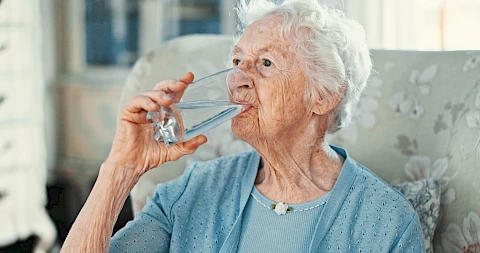
March marks National Nutrition Month, a time to focus on the importance of making informed food choices and developing sound eating habits. As we celebrate this month, it's important to emphasize hydration, especially for seniors. Hydration is not just about quenching thirst; it plays a pivotal role in maintaining overall health and well-being. At Senior Helpers Blue Ridge, we are committed to helping seniors stay healthy and hydrated.
The Value of Hydration for Seniors
As we age, our bodies become more susceptible to dehydration. Seniors often experience a diminished sense of thirst, which means they might not always feel the need to drink water.
Additionally, certain medications and medical conditions can increase the risk of dehydration. Staying hydrated is vital for seniors as it helps maintain healthy body functions. Proper hydration aids in digestion, supports cognitive function, and helps regulate body temperature.
Recognizing Signs of Dehydration
Both seniors and their caregivers need to recognize the signs of dehydration to prevent it from becoming a serious health issue. Common symptoms include:
- Dry mouth and lips
- Fatigue
- Headaches
- Dizziness or lightheadedness
- Dark colored urine
If left unaddressed, dehydration can lead to more severe health problems, such as urinary tract infections, kidney stones, and even cognitive impairments. Therefore, identifying these early signs can make a big difference.
Strategies to Increase Fluid Intake
To prevent dehydration, seniors should aim to consume adequate amounts of fluids daily. Setting daily hydration goals is a great place to start. A good target is about eight glasses of water a day, but individual needs may vary.
Creating a hydration schedule can further encourage consistent water intake. For instance, drink a glass of water with each meal and between meals. Reminders can also be set at regular intervals throughout the day to sip on water.
Choosing Hydrating Foods
Incorporating hydrating foods into meals is another effective way to boost fluid intake. Foods with high water content can contribute to overall hydration. Consider adding watermelon, cucumbers, oranges, broths, soups, and yogurt to daily meals. These foods are not only hydrating but also packed with nutrients that are beneficial for senior health.
Making Water More Appealing
Some may find plain water unappealing, but there are simple ways to enhance its taste and make it more enjoyable. Try adding slices of lemon, lime, or cucumber to add a refreshing twist. Infusing water with berries or mint leaves can also provide a subtle, pleasant flavor. Alternative hydrating beverages can include herbal teas and coconut water. However, avoid drinks high in sugar or caffeine, as they can have a dehydrating effect.
Ensuring that water is readily accessible can significantly help seniors stay hydrated. Keeping a water bottle or glass within arm's reach at all times is a practical approach. Have water available in various areas of the home, such as by the bedside, in the living room, and in the kitchen. This constant presence serves as a visual reminder to drink more often.
Stay Hydrated, Stay Healthy!
By understanding the importance of hydration and implementing simple strategies such as those discussed here, seniors and their caregivers can ensure they stay properly hydrated. We encourage you to take these tips to heart.
For personalized senior care services and more tips on senior health, contact us at Senior Helpers Blue Ridge. Our dedicated teams in Charlottesville, Harrisonburg, Bridgewater, Gordonsville, and Crozet are ready to assist.